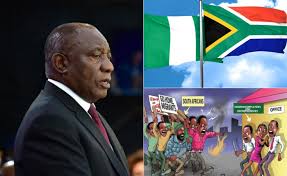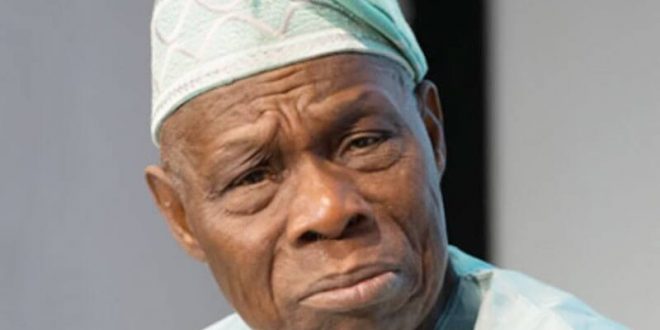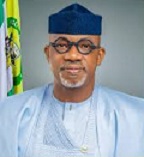BY RAYMOND OSHO
 ABEOKUTA: Former President Olusegun Obadanjo has reacted to the on-going xenophobic attack on Nigerians and some other African Nationale in South Africa.
ABEOKUTA: Former President Olusegun Obadanjo has reacted to the on-going xenophobic attack on Nigerians and some other African Nationale in South Africa.
Scores of Nigerians and other natives from other Africa countries have been massacred in South Africa due to afrophobia.
Obadanjo in an open letter to Prince Mangosuthu Buthelezi MP, President, Inkatha Freedom Party on Monday September 14, 2019 advised that repatriation of Nigerians from South Africa or revenge is obviously not a permanent solution.
He said the hurt would still remain for some time, adding that Mutual understanding and acknowledgement of what needs to be done on all sides is imperative and getting down to doing them is the solution that would serve Nigeria and South Africa.
Obasanjo urged countries, whose citizens were affected to table appropriate motions at the African Union (AU) and consider other measures if the situation is allowed to continue.
The letter reads “For any African country to encourage or allow or not seriously sanction xenophobia against Africans in their country, it is a great disservice not only to the country where xenophobia takes place and the countries of the victims concerned, but also a great disservice to the whole of Africa and black race.
“Need for fence-mending, reconciliation and wound-binding between South Africa and the countries whose citizens have been victims of xenophobia and afrophobia in South Africa. As a suggestion, South Africa should send emissaries to the countries concerned to explain, apologise and agree on the way forward for mutual understanding, accommodation, reconciliation, and binding the wound to promote unity, concord, and brotherhood in Africa.”
“Repatriation of Nigerians from South Africa is obviously not a permanent solution. At best it is palliative. But the hurt will still remain for some time. Neither is revenge a desirable solution. Mutual understanding and acknowledgement of what needs to be done on all sides is imperative and getting down to doing them is the solution that will serve Nigeria and South Africa and indeed Africa well particularly in this era of Africa Continental Free Trade Area opportunities.”
“Nigeria and South Africa must stand together to champion African cause and to jointly shepherd African development, unity, cooperation, security, and progress to make the 21st century Africa’s century.”
“The xenophobia or afrophobia going on in South Africa is an unfortunate issue for South Africa and for the whole of Africa. It is unfortunate in many respects. There are only two countries in Africa that have ‘Africa’ as part of their names: Central Africa Republic and Republic of South Africa. For any of these two countries and, I dare say, for any African country to encourage or allow or not seriously sanction xenophobia against Africans in their country, it is a great disservice not only to the country where xenophobia takes place and the countries of the victims concerned, but also a great disservice to the whole of Africa and black race.”
“I also want to thank you for referring in the same statement to Nigeria’s contribution and my own personal contribution to the struggle against colonialism in Southern Africa and apartheid in South Africa. I must also commend others in South Africa who have taken a similar position in the overall interest of Africa.”
“We, in Nigeria, if I may speak particularly for Nigeria, did all that we did for liberation in different parts of Africa, particularly in Southern Africa, including getting rid of apartheid in South Africa because we believed it was our obligatory duty to do so as Africans.”
“We, as black people, believed and still believe that we would be second-class citizens in the world if we allowed any black people anywhere in the world, not to talk of Africa, to be treated as second-class citizens because of the colour of their skin without fighting against it. It is because of our belief in human dignity generally and especially afro dignity. We were motivated and goaded by principle and not by possession, position or praises.”
“We were not doing it to get any reward or material benefit as such. We were doing it because we were convinced that it was our duty, our responsibility and our obligation to humanity and to the black race. That is why we, in Nigeria, in spite of our distance from the frontline of the struggle against colonialism in Southern Africa and apartheid in South Africa, we became, in terms of our participation, contribution, commitment and sacrifice, members of the front line States.
“Whether that is recognised and appreciated or not, we really don’t mind as we believe we have done our duty as we ought to have done, and if occasion occurs in future where we need to open our doors, out of our humanity and Africanity, for people in similar situation of need as happened to people in Southern Africa and South Africa, we will do it again as we did in the past.”
“The best way to fight crime is to achieve close to full employment in a society and not through xenophobia. Anybody who can deny xenophobia in South Africa of today can deny that my mother is a woman. It should not be a game of denial but rather a game of accepting reality and working at it, together with the rest of Africa where necessary.”
“As it is being touted that xenophobia will give South Africans jobs, I dare say, it is fallacy. Xenophobia will make investment in South Africa a little bit more difficult which will lead to lack of job creation and loss of existing jobs”
 Startrend International Magazine For Your Latest News And Entertainment Gists
Startrend International Magazine For Your Latest News And Entertainment Gists





